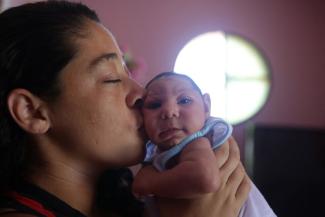Health care
Zika and pharma research

So far, there is neither an easy-to-handle diagnostic test nor a therapy. There is no vaccination. None of this is surprising. To date, Zika was not considered a problem.
Scenarios of this kind will keep recurring in the future. Nature holds in store a huge number of pathogens, many of which have not caused concern yet, but may do so any day. Zika has been known for a long time, but now there is the suspicion that it does not only cause harmless rashes and fever, but also leads to unborn babies becoming severely malformed.
For issues like Zika, we need publicly funded research. Otherwise, it will be impossible to ensure that new medications, vaccines and diagnostics are made available fast, at low cost and all over the world if need be.
Because of how it is transmitted, Zika mostly affects people in tropical regions, and in particular those who live in poor settlements. In some ways, it is similar to Ebola and the so called tropical neglected diseases, which have been known for a long time and affect many people. Since they do not haunt industrialised countries, however, commercial researchers do not take interest.
According to the WHO, the initiative to act must not be left to pharmaceutical corporations in cases like this. That industry’s business model is based on patent rights which allow companies to reclaim research expenditure by exploiting temporary monopolies. This model does not work when a disease is neglected because of lacking purchasing power. Insistence on exclusive rights, moreover, would mean to intentionally exclude people in need from treatment.
In 2008, the World Health Assembly published a strategy and a global action plan to tackle ailments that haunt poor countries. One of its core component is providing incentives for researchers. The debate on how to develop affordable pharmaceuticals and ensure universal access has since been making progress. To people in developing countries, these matters are vitally important.
Product development partnerships involving private-sector and public-sector parties are underway to tackle some diseases. Funding tends to be provided by state institutions and charitable foundations. Pilot projects are testing how to develop new treatments without relying on patents. The focus is on questions in which stock-market-listed corporations are not interested normally:
- How does one delink product prices from massive research costs?
- What kind of funding instruments are effective (pooled funding, prizes and others)?
- How does one facilitate “open knowledge”, allowing anyone interested free and fast access to empirical data and research results?
The core issue is to do research in the service of public health. A pilot project to develop a vaccine for Schistosomiasis is currently being run in Brazil. Experience gathered in its context may well prove useful for Zika research.
By the way, Ebola research would not have made much headway without public funding. In 2014, some $ 165 million were invested, of which $ 114 million was public money, almost exclusively from the US budget.
Finding alternatives to the patent-driven pharma model is essential. We need a system that is not primarily geared to the interests of multinational corporations. It must serve the needs of global health care. Concepts designed to provide the highest possible prices and profits are destructive. Humankind needs affordable medicines, not exclusion.
Public funding will be indispensable. It would make sense to establish an international fund in order to finance important projects. Pathogens do not stop at borders – and health is something that concerns everyone.
Christian Wagner-Ahlfs works for BUKO Pharma-Kampagne, a German civil-society organisation.
cw@bukopharma.de
Link:
The World Health Assembly’s Strategy and Action Plan:
http://apps.who.int/gb/CEWG/pdf/A61_R21-en.pdf







